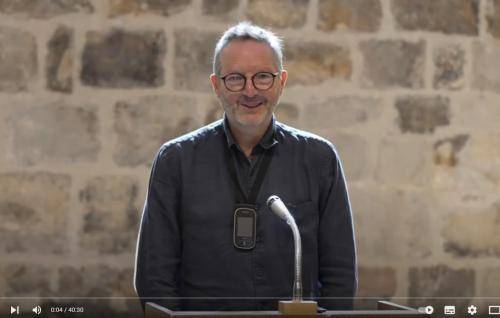The Poetry of Epiphany
The Poetry of Epiphany
Poetry from Malcolm Guite to reflect upon the season of Epiphany.
1. Our Questing Hearts
These Epiphany reflections start with the feast of Epiphany itself, and the arrival of the three wise men at Bethlehem.
Until now the story of the coming Messiah has been confined to Israel, but here suddenly, mysteriously, are three Gentiles who have intuited that his birth is good news for them too. This is an Epiphany, a revelation, that the birth of Christ is not one small step for a local religion but a great leap for all humanity. Here’s a poem reflecting on that:
The Magi
It might have been just someone else's story;
Some chosen people get a special king,
We leave them to their own peculiar glory,
We don't belong, it doesn't mean a thing.
But when these three arrive they bring us with them,
Gentiles like us, their wisdom might be ours;
A steady step that finds an inner rhythm,
A pilgrim's eye that sees beyond the stars.
They did not know his name but still they sought him
They came from otherwhere but still they found;
In palaces they found those who sold and bought him,
But in the filthy stable, hallowed ground.
Their courage gives our questing hearts a voice
To seek, to find, to worship, to rejoice.
2. The Single Loving Heart
Another epiphany which we contemplate in this season is Christ’s Baptism.
This is epiphany, or ‘showing forth’ par excellence, for here we glimpse the whole Trinity: The Father blesses the Son, and the Spirit descends as a dove. This is not only a revelation about God, but also about us, for our own baptism draws us into the Son, so that the Spirit falls on us, and the Father says of us too ‘this is my beloved child’.
Here’s a poem reflecting on that:
The Baptism of Christ
Beginning here we glimpse the Three-in-one;
The river runs, the clouds are torn apart,
The Father speaks, the Spirit and the Son
Reveal to us the single loving heart
That beats behind the being of all things
And calls and keeps and kindles us to light.
The dove descends, the spirit soars and sings
'You are belovèd, you are my delight!'
In that swift light and life, as water spills
And streams around the Man like quickening rain,
The voice that made the universe reveals
The God in Man who makes it new again.
He calls us too, to step into that river,
To die and rise and live and love forever.
3. The spring of love
The third story we contemplate in Epiphany season is Jesus’ first miracle, when he turns water into wine at the wedding at Cana.
Here too is another epiphany, the first of the signs that Jesus gave to manifest his glory, a sign that points to God’s abundant generosity. This epiphany also moves us from mere outward purity, symbolised by the water for ritual washing, to a transformation of inward joy, symbolised by the wine.
But most importantly, this sign points to Christ’s gift of his very self, his own heart’s blood, given once for all on the cross and received by us in communion. I have tried to bring out some of this in the following sonnet.
The Miracle at Cana
Here's an epiphany to have and hold,
A truth that you can taste upon the tongue,
No distant shrines and canopies of gold
Or ladders to be clambered rung by rung,
But here and now, amidst your daily living,
Where you can taste and touch and feel and see,
The spring of love, the fount of all forgiving,
Flows when you need it, rich, abundant, free.
Better than waters of some outer weeping,
That leave you still with all your hidden sin,
Here is a vintage richer for the keeping
That works its transformation from within.
'What price?' you ask me, as we raise the glass,
'It cost our Saviour everything he has’.
4. Sheer grace
We have just celebrated the Conversion of St. Paul.
It is an astonishing story. That Saul, the implacable enemy of Christianity, should be chosen by God to be Christianity’s greatest proponent is only the first of a series of dazzling and life-changing paradoxes that flow from Paul’s writing.
At the heart of these is the revelation of God’s sheer grace; finding the lost, loving the violent into light, and working everything through the very weakness of those who love him.
Here’s a sonnet celebrating just a little of what I glimpse in the great Apostle.
St Paul
An enemy whom God has made a friend,
A righteous man discounting righteousness,
Last to believe and first for God to send,
He found the fountain in the wilderness.
Thrown to the ground and raised at the same moment,
A prisoner who set his captors free,
A naked man with love his only garment,
A blinded man who helped the world to see,
A Jew who had been perfect in the Law,
Blesses the flesh of every other race
And helps them see what the apostles saw -
The glory of the Lord in Jesus' face.
Strong in his weakness, joyful in his pains,
And bound by Love, who freed him from his chains.








